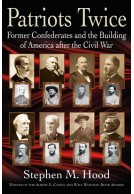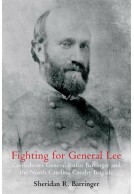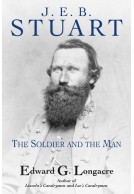Google Books previews are unavailable because you have chosen to turn off third party cookies for enhanced content. Visit our cookies page to review your cookie settings.
Confederate Waterloo (Hardback)
The Battle of Five Forks, April 1, 1865, and the Controversy that Brought Down a General
Imprint: Savas Beatie
Pages: 336
Illustrations: 55 images, 10 maps
ISBN: 9781611213096
Published: 31st March 2017
Pages: 336
Illustrations: 55 images, 10 maps
ISBN: 9781611213096
Published: 31st March 2017
You'll be £10.50 closer to your next £10.00 credit when you purchase Confederate Waterloo. What's this?
+£4.99 UK Delivery or free UK delivery if order is over £40
(click here for international delivery rates)
Need a currency converter? Check XE.com for live rates
(click here for international delivery rates)
Need a currency converter? Check XE.com for live rates
“It could be classified as a mere skirmish, but no other fight of the entire four years’ struggle was followed by such important consequences,” explained former Confederate General Thomas Munford years after the Civil War. “It extinguished the campfires of the hitherto invincible army and was the mortal blow which caused the Southern Confederacy to perish forever.” The Battle of Five Forks broke the long siege of Petersburg, triggered the evacuation of Richmond, precipitated the Appomattox Campaign, and destroyed the careers and reputations of two generals. Michael J. McCarthy’s Confederate Waterloo is the first fully researched and unbiased booklength account of this decisive Union victory and the aftermath fought in the courts and at the bar of public opinion.
General Lee’s Army of Northern Virginia had been locked into the sprawling defenses surrounding the logistical stronghold of Petersburg and the Southern capital at Richmond for more than eight months when General Grant struck beyond his far left flank to break the extended Rebel lines. A series of battles led up to April 1, when General Phil Sheridan’s forces struck at Five Forks. The attack surprised and collapsed General George Pickett’s Confederate command and turned Lee’s right flank. An attack along the entire front the following morning broke the siege and forced the Virginia army out of its defenses and, a week later, into Wilmer McLean’s parlor to surrender at Appomattox.
Despite this decisive Union success, Five Forks spawned one of the most bitter and divisive controversies in the postwar army when Sheridan relieved Fifth Corps commander Gouverneur K. Warren for perceived failures connected to the battle. The order generated a lifelong effort by Warren and his allies to restore his reputation by demonstrating that Sheridan’s action was both unfair and dishonorable. The struggle climaxed with a Court of Inquiry that generated a more extensive record of testimony and exhibits than any other U.S. military judicial case in the 19th Century. In addition to Sheridan and Warren, participants included Gens. U. S. Grant and Winfield S. Hancock, and a startling aggregation of former Confederate officers.
McCarthy’s Confederate Waterloo is grounded upon extensive research and a foundation of primary sources, including the meticulous records of a man driven to restore his honor in the eyes of his colleagues, his family, and the American public. The result is a fresh dispassionate analysis that may cause students of the Civil War to reassess their views about some of the Union’s leading generals.
Other titles in Savas Beatie...














